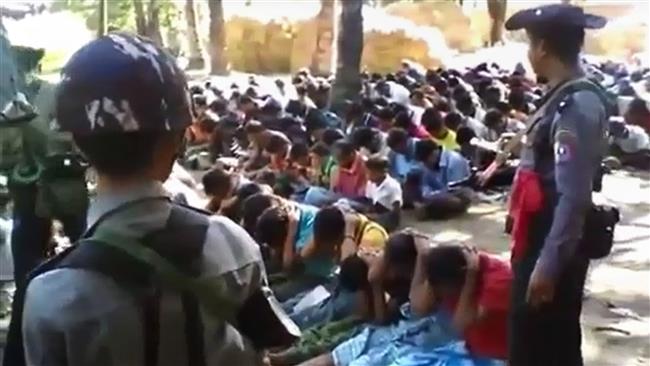
RNA - Army chief Min Aung Hlaing defended the military campaign while speaking to crowds assembled in the capital Naypyidaw for armed forces day on Monday.
The military chief branded Rohingya Muslims as illegal immigrants from Bangladesh or "Bengalis" despite many living there for generations.
"The Bengalis in Rakhine State are not the Myanmar nationalities but the immigrants," Hlaing said.
Elsewhere in his remarks, the commander-in-chief of the Myanmar armed forces blamed Muslims for a series of attacks across the troubled region on security forces that occurred October last year.
"The terrorist attacks which took place in October 2016 resulted in the political interferences."
The remarks come after the top United Nations human rights body on Friday agreed to send an international fact-finding mission to investigate widespread allegations of killings, rape and torture by security forces against Rohingya Muslims in Myanmar’s Rakhine state.
Sources say the mission will seek to ensure "full accountability for perpetrators and justice for victims."
However, the UN Human Rights Council (UNHRC) stopped short of calling for the establishment of a Commission of Inquiry - the world body’s highest level investigation - into the situation of the Rohingya despite a call by Yanghee Lee, the UN’s special rapporteur on rights in Myanmar.
UN investigators believe security forces may have committed crimes against humanity.
Myanmar’s de facto leader Aung San Suu Kyi has, meanwhile, rebuffed the UN probe, saying any international fact-finding mission "would do more to inflame, rather than resolve, the issues at this time."
Rights groups have cast doubt on the impartiality of several investigative commissions set up by Suu Kyi to look into the crimes against the Rohingya.
Myanmar has long faced criticism for its treatment of the more than one million Rohingya who live in Rakhine State.
Since October 2016, Myanmar’s forces have been carrying out a military crackdown in Rakhine State, where the Rohingya community is mainly based, following a raid on a police post that was blamed on Rohingya-linked militants.
In a report last month, Reuters cited two UN officials dealing with refugees fleeing violence as saying that some 1,000 Rohingya Muslims may have been killed in Myanmar’s army crackdown on the minority group.
At least 75,000 Rohingya have since fled from Myanmar to Bangladesh, according to the UN.
UN investigators, who interviewed Rohingya escapees in neighboring Bangladesh, have blamed Myanmar’s government forces for responding with a campaign of murder, gang rape and arson that they say may amount to genocide.
Myanmar classifies Rohingya Muslims as stateless or non-citizens, a status which strips them of the right to education, work or social services.
847/940